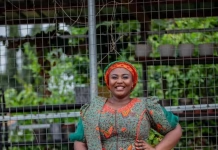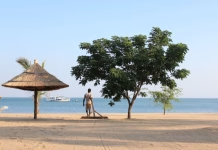
Ghana’s Deputy Minister for Education, Rev. John Ntim Fordjour MP, has entreated African countries to increase investments in education at all levels to transform the fortunes of the continent.
Rev. Fordjour said Africa was already 100 years behind the rest of the world and needed to leapfrog with urgent investments in education to cover every child without delay.
It was imperative to explore innovative funding and collaborations to ensure that education was accessible at all levels to the people.
He said despite the abundant natural resources, Africa could only get out of poverty with a well-educated and skilled workforce.
“We are facing many challenges but if we are to resort to investing right, revamping and deploying curriculums that are responsive to the needs of the 21st century, a lot will be achieved”

The Deputy Minister, who is also a Member of Parliament (MP) for Assin South, was addressing the opening session of the 13th Cape Coast Technical University (CCTU) Sustainable Education and Development Research Conference, at the University of Cape Coast (UCC).
The four-day conference on the theme: “Inclusive and equitable quality education and lifelong learning opportunities for researchers,” hinged on the Sustainable Development Goal (SDG) four, putting a spotlight on critical issues affecting the world, particularly Africa, and challenges researchers face and finding solutions to them.
It would also provide a platform for capacity building and networking among researchers, school authorities, students, policymakers, scientists, entrepreneurs and industry captains.
The conference assembled accomplished academics from tertiary institutions from across the continent, including schools from Ghana, South Africa, Nigeria, Uganda, and Tanzania.
Rev. Fordjour stated that “the continent must ensure that a critical of the youthful population has been given the opportunity to access quality education at all levels and systemic barriers in the way are removed such that we will be able to be on the path of sustainable development in the next few decades.”
He asserted that with the youth in Africa predicted to form 42 per cent of the population of young people globally in a few years, it was critical to ensure that they were adequately prepared to make equivalent contributions to innovations, jobs, and investments.

Alluding to research, he expressed concern that nearly 825 million young people, including those educated, would reach adulthood without the relevant skills required to thrive if nothing changed.
“…825 million young people is half of the global youthful population, and we cannot have that phenomenon becoming a reality…” he said.
He underscored the importance of ensuring access to quality education for the youth to ensure equal opportunities and regardless of their backgrounds, their talents and learning differences must be supported to attract the best outcomes.
Rev. Fordjour said Ghana was leading the charge in education investment, and touted some interventions and achievements of the government since 2017, such as the Free Senior High School policy, which had seen enrolment into second-cycle institutions soaring from 830,000 in 2016 to 1.48 million, with a gender parity of 100 per cent as against the 68 per cent female-male ratio in 2016.
He said only two per cent of pupils in primary two could read in 2015 but there was a significant appreciation to 38 per cent as of 2022 with hopes of improving the situation further.
“We are not where we want to be, but we are definitely not where we used to be and we want to put in sustainable measures to ensure that in the next three years if another test is conducted, we will achieve a minimum of 90 per cent at the appropriate age,” he said.
He also mentioned some reforms to the school curriculum to ensure critical thinking, creativity, collaboration, and communication, adding that TVET had now become attractive in Ghana with a record enrolment in the various institutions due to the massive investment in the sector.
The conference saw the launch of a book titled: “Measuring Productivity of Labour-Intensive Work Practices in Road Construction in Africa,” authored by Professor Emmanuel Bamfo-Agyei and two others.
Awards were also presented to personalities who have distinguished themselves in education development and transformation, including President H.E Nana Addo Dankwa Akufo-Addo and Dr Dr. Yaw Osei Adutwum, the Education Minister.
Read Also >>>> NAGRAT disappointed with Government’s Free SHS Bill
Meanwhile, the Auxiliary Bishop of Accra Archdiocese, Most Reverend John Kobina Louis, has expressed concern that the quality of Ghana’s education system has declined over the past few decades, primarily due to political decisions.
He emphasized the need for sincere collaboration between the Government, the Ministry of Education, the Ghana Education Service, and key stakeholders, including, the Ghana Catholic Bishops’ Conference, Religious and Traditional leaders, Parent and Teacher associations, Learners, and Alumni.
Speaking at the 90th-anniversary lecture of St. Augustine’s College in Accra, Most Reverend Louis stressed that this collective effort is essential to review and refine national policies, administrative procedures, and practices to ensure that learners receive a holistic and nation-building education, which is critical for Ghana’s development. Continue reading here >>>>





















